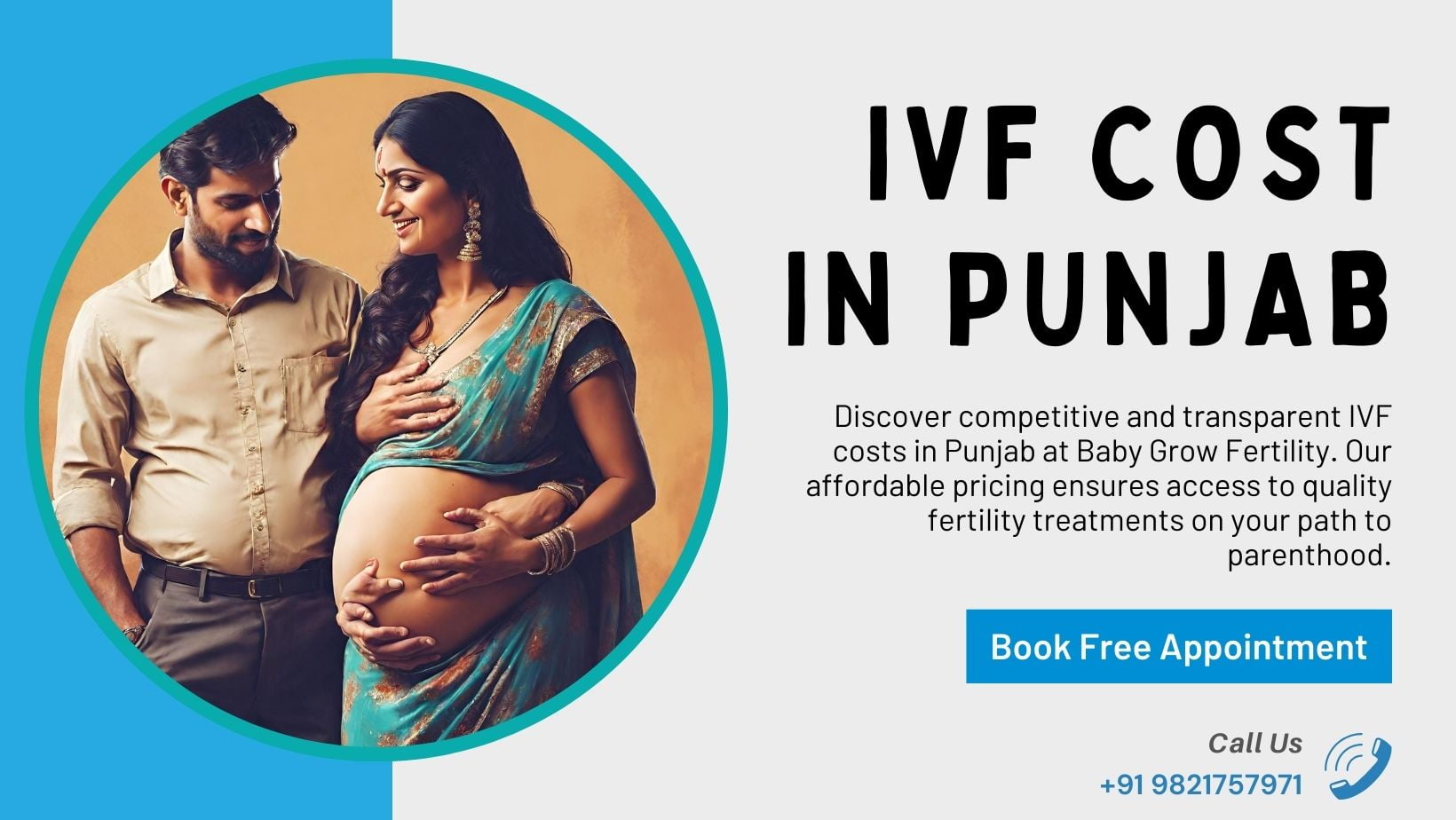Navigating the journey of IVF can be both emotionally and financially daunting, but at Baby Grow Fertility, we strive to provide clarity and transparency regarding the IVF cost in Punjab. Understanding the importance of affordability and accessibility, we offer competitive pricing without compromising on the quality of care.
Our IVF Cost in Punjab is tailored to meet individual needs, with packages that include comprehensive services such as consultations, fertility assessments, medical procedures, and post-treatment support. We believe in empowering our patients with detailed information about costs upfront, ensuring peace of mind and informed decision-making throughout the fertility treatment process.
At Baby Grow Fertility, we are committed to making fertility treatments, including IVF, accessible to all who seek our services. Our dedicated team is here to guide you every step of the way, providing personalized care and support as you embark on the journey to parenthood. With transparent pricing and compassionate care, Baby Grow Fertility is your trusted partner in achieving your dream of starting a family.
What is IVF and How Does it Work?
In vitro fertilization (IVF) is a specialized fertility treatment that assists individuals and couples in achieving pregnancy when other methods have not been successful. It involves combining sperm and eggs outside the body, in a laboratory setting, to create embryos. These embryos are then transferred to the uterus, where they may implant and develop into a pregnancy.
The IVF Process typically consists of several key steps:
- Ovarian Stimulation: The woman undergoes hormonal medications to stimulate the ovaries to produce multiple eggs.
- Egg Retrieval: Once the eggs have matured, they are retrieved from the ovaries using a minor surgical procedure.
- Fertilization: The retrieved eggs are then combined with sperm in a laboratory dish, where fertilization occurs. This can be done through conventional insemination, where sperm is directly added to the eggs, or through intracytoplasmic sperm injection (ICSI), where a single sperm is injected directly into each egg.
- Embryo Culture: The fertilized eggs, now embryos, are cultured and monitored in the laboratory for several days as they develop.
- Embryo Transfer: One or more of the resulting embryos are selected for transfer into the woman’s uterus through a thin catheter. Any remaining embryos may be cryopreserved (frozen) for future use.
- Pregnancy Test: Approximately two weeks after the embryo transfer, a pregnancy test is conducted to determine if implantation has occurred.
Who Can Benefit from IVF Treatment?
IVF may be recommended for individuals or couples facing certain fertility challenges, including:
- Fallopian Tube Blockages or Damage: IVF can bypass blocked or damaged fallopian tubes, allowing fertilization to occur outside the body.
- Male Factor Infertility: IVF can help couples where the male partner has low sperm count, poor sperm motility, or abnormal sperm morphology by directly injecting sperm into the egg (ICSI).
- Endometriosis: IVF may be beneficial for individuals with endometriosis, a condition where tissue similar to the lining of the uterus grows outside the uterus, impacting fertility.
- Unexplained Infertility: In cases where the cause of infertility remains unknown despite thorough evaluation, IVF may offer a chance for conception.
- Advanced Maternal Age: IVF may be recommended for women of advanced maternal age (typically over 35), as fertility declines with age, making conception more challenging.
- Recurrent Pregnancy Loss: Individuals who have experienced recurrent miscarriages may benefit from IVF with preimplantation genetic testing (PGT) to screen embryos for chromosomal abnormalities before transfer.
- Same-Sex Couples and Single Individuals: IVF provides an opportunity for same-sex couples and single individuals to build their families through the use of donor eggs, sperm, or embryos.
Cost of Initial Consultation
When embarking on the journey of IVF treatment, the initial consultation serves as the crucial starting point. Here, prospective parents meet with fertility specialists to discuss their unique situation, medical history, and treatment options. Understanding the significance of this consultation entails delving into the associated fees and what they encompass.
Explaining Consultation Fees and What They Cover
The consultation fee typically includes the time and expertise of the fertility specialist, along with administrative costs. During this session, patients receive personalized attention as the doctor evaluates their medical background, conducts necessary assessments, and formulates a tailored treatment plan. Additionally, the fee may cover initial diagnostic tests and discussions about potential procedures, medications, and associated expenses.
Tips for Maximizing the Value of the Initial Consultation
To make the most out of the initial consultation, it’s advisable to come prepared with relevant medical records, questions, and concerns. Open communication is key; be honest about your fertility journey, expectations, and any lifestyle factors that might impact treatment. Take notes during the consultation to ensure clarity and understanding. Lastly, inquire about any additional resources or support services offered by the clinic to aid in your fertility journey.
Get Free Surrogacy Consultation
IVF Cost in Punjab
The IVF Cost in Punjab can vary depending on several factors such as the clinic’s reputation, the expertise of the medical staff, and the specific services included in the treatment package. On average, IVF treatment in Punjab may range from INR 80,000 to INR 150,000 per cycle. This cost typically covers initial consultations, ovarian stimulation medications, egg retrieval procedures, laboratory fees for fertilization and embryo culture, embryo transfer, and follow-up consultations. Additional expenses may include diagnostic tests, genetic screenings, and optional add-on services such as embryo freezing or preimplantation genetic testing. It’s essential for intended parents to carefully review and understand the breakdown of IVF costs to make informed decisions about their fertility treatment journey.
Diagnostic Tests and Screening Costs
Before proceeding with IVF treatment, thorough diagnostic testing is essential to assess the underlying factors affecting fertility and to customize the treatment plan accordingly.
Importance of Pre-IVF Diagnostic Tests
Pre-IVF diagnostic tests play a pivotal role in identifying any potential obstacles to conception, such as hormonal imbalances, genetic abnormalities, or structural issues in the reproductive system. By pinpointing these elements right off the bat, ripeness experts can devise a more designated and compelling treatment approach, in this way expanding the possibilities of an effective result. These tests also provide valuable insights into the overall health and well-being of both partners, ensuring safe and optimal treatment.
Common Tests and Their Associated Costs
Diagnostic tests commonly performed before IVF treatment may include blood tests to assess hormone levels, ultrasound scans to evaluate ovarian reserve and uterine health, genetic screening to identify hereditary conditions, and semen analysis to assess male fertility. The costs of these tests can vary depending on the complexity and frequency required. While certain facilities might package these costs into an exhaustive indicative bundle, others might charge independently for each test. It’s important for patients to inquire about the specific tests recommended for their situation and the associated costs to make informed decisions regarding their fertility journey.
Cost of Procedures
Breakdown of Costs for Each IVF Procedure
- Delving into the Specific Expenses Associated with Each Step of the IVF Process
- Understanding the Itemized Costs for Procedures such as Ovulation Induction, Egg Retrieval, Fertilization, and Embryo Transfer
- Explaining How Each Component Contributes to the Overall Cost of IVF Treatment
Understanding Additional Procedures and Their Costs (ICSI, IUI, etc.)
- Shedding Light on Supplementary Techniques like Intracytoplasmic Sperm Injection (ICSI) and Intrauterine Insemination (IUI)
- Exploring the Financial Implications of Incorporating These Procedures into the IVF Treatment Plan
- Clarifying the Role of Additional Procedures in Enhancing the Success Rates of IVF and Their Impact on the Total Expenses
Conclusion
In conclusion, navigating the IVF Cost in Punjab requires careful consideration of various factors such as clinic reputation, treatment protocols, and additional services offered. While cost is an important aspect, it should not overshadow the quality of care and expertise provided by the fertility center. It’s essential to choose a reputable clinic like ours at Baby Grow Fertility, where transparency, affordability, and success rates are prioritized. Our team is dedicated to guiding you through every step of the process, ensuring that your journey to parenthood is both financially feasible and emotionally fulfilling. Take the first step towards building your family with confidence and trust in our expert care.
Read More:-
- Best Surrogacy Centre in Patna 2024: Empowering Parenthood Journeys
- Best Surrogacy Centre in Manipur with Highest Success Rate in 2023
- Best Surrogacy Centre in Guwahati 2023: A Comprehensive Guide
- Best Surrogacy Centre in Kanpur: A Comprehensive Guide
- Best Surrogacy Centre in Rohini With Highest Success Rate in 2023




